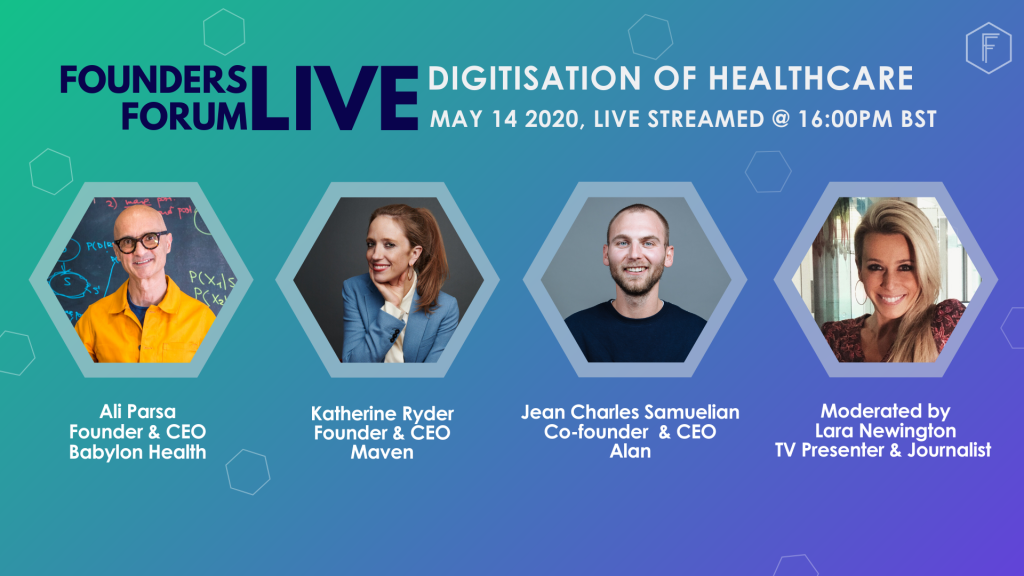Last updated on January 20, 2025
—–
At a recent online event entitled ‘The Digitisation of Healthcare,’ Founders Forum featured headline-hitting founders including Dr Ali Parsa, Founder & CEO, Babylon Health; Katherine Ryder, Founder & CEO, Maven; and Jean-Charles Samuelian, Co-Founder & CEO, Alan. The conversation was led by renowned journalist and guest moderator Lara Lewington, BBC Click who guided the discussion on the rise of digital health followed by an open Q&A.
Rapid adoption of new technologies can be seen across global health systems, with the recent takeover of telemedicine and boom in digital health. Healthtech startups have played a vital role during the global pandemic, from symptom tracking to supporting front-line staff; loaning vital equipment and resources; providing online patient care; and gathering and analysing data to help support both private and public healthcare systems.
The panelists represented leading brands in digital health, with British unicorn Babylon Health introducing the COVID-19 Care Assistant to offer UK patients direct support, medical information and actionable guidance. Meanwhile, Maven Clinic connected women across the country with practitioners for mental health, paediatrics & OB/GYNs through their app-based platform, following their recent $45M Series C raise. During this time, health insurance provider Alan partnered with LIVI to provide telehealth to all its customers, and secured $54.4M of additional funding to extend the product offering as a wholistic health platform. We would like to offer our thanks to our speakers for generously giving sharing their time to bring this timely discussion to the forefront.

—–
1.The COVID-19 crisis has forced the culture-shift that was necessary for the adoption of telemedicine
- While the technology underpinning telemedicine has existed for a number of years, it was the reluctance of consumers and healthcare providers to change behaviours that had delayed the adoption of telemedicine.
- For example, the rapid, forced reduction in regulatory roadblocks in the UK and US has fast-tracked procurement processes that would often take months.
Dr Ali Parsa, Babylon Health – “Now people have used telemedicine, I don’t think they’re ever going to go back”…
- Babylon Health launched in NYC during the crisis: a totally new city, with a novel regulatory environment and new payments systems. This would usually have taken months but was reduced down to weeks due to regulator and vendor urgency.
- Similarly, Maven has reported overall platform use up by 50%, with areas like mental health support up as much as 300%, as consumers are forced to try telemedicine in the absence of alternatives.
Katherine Ryder, Maven – “telemedicine businesses are now able to show exactly how well they can deliver on modern and efficient care delivery.”
2. Telemedicine is not, however, a silver bullet for healthcare
- Despite rapid popularisation, telemedicine isn’t a fix-all for current healthcare problems: the doctor behind the screen is still nearly as expensive as the doctor in a clinic
- Increased telemedicine demand during Covid-19 has streamlined action to combat this overreliance on doctors
- For example, start-ups have digitised the protocols that doctors use for in-person consultations; added in clinically supervised (but not permissioned) representatives to handle customer service questions; and published instructional videos on hand washing & symptom tracking.
- These moves have reduced strain on physical doctors, and suggest a future in which more healthcare can be provided without the need for a doctor’s direct involvement
Dr Ali Parsa, Babylon Health – “Our emphasis has been on giving patients access to quick reliable medical information and get them answers so that the vast majority can take the necessary action in most cases without having to speak to a doctor. That has meant that while we have tripled the number of patients, we have only increased the number of doctors by 25% because 80% have already been supported”
3. This crisis provides the opportunity to make healthcare more customer centric
- Alongside reducing the reliance on physical doctors, the crisis provides an opportunity to deliver more continuous care between in-person services and the rising number of digital solutions
- There is now an chance for medicine to operate on a concierge basis, with centralised ownership of health data for the individual
- It is vital for telehealth platforms to be aware of the need to protect individual data while allowing this centralised access, with individuals in control of their data through a user-owned hub
- Digital health is a route to accessing healthcare, like food delivery or transportation – not the solution in and of itself, and a hybrid physical-digital model will be the most effective
Dr Ali Parsa, Babylon Health – What we really now need to do is reinvent the model of the delivery of care to go from a reactive transactional crisis based model to a proactive one that keeps people healthy, so we don’t run into expensive crisis after expensive crisis.”
Jean-Charles Samuelain, Alan – “One of the biggest problems of the healthcare industry is that it was not user centric: in a way, it was not designed for the end user.”
Jean-Charles Samuelain, Alan – “We should have a hippocratic oath for telehealth platforms, like we do for doctors… Us as an insurance company, we should not use that data to individualise pricing – we want to align incentives with our members. So we want to tell them, if you share with us more than less, we are not going to change the price, we are just going to give you a better user experience, better services, better information.”
4. Rising digital health could open up the democratisation of healthcare access, globally
- With greater automation and efficiency in healthcare delivery, an opportunity will open up to democratise access to healthcare
- ~70% of healthcare cost is spent on predictable, preventable diseases, and by automating the monitoring of these, issues can be avoided and health budgets freed up to focus on more difficult areas
Katherine Ryder, Maven – “if you don’t allow patients to be empowered, see what’s wrong and then innovate around it, then you’re continuing to push ahead of an existing broken system.”
- The $10 trillion health care system serves ~50% of the world’s population, whilst 50% have no access to it. If resource could be freed up in developed nations, those without access to healthcare could be better supported
- Telemedicine has helped decrease cost of healthcare from $5-6 per consultation to $1 per consultation in some of the world’s poorest countries (e.g. Rwanda) – this momentum should continue
- The human suffering of the COVID-19 crisis means there is a responsibility to ensure the positive changes in healthcare are lasting
Dr Ali Parsa, Babylon Health – “The system we have right now it’s not a healthcare system: it’s a sick care system, we wait for emergencies, and we deal with those crises and emergencies. We can do a lot better than that. We should fundamentally rethink the old system and how we deal with people further upstream – as trying to prevent and predict is better than trying to cure. Otherwise this will be a crisis gone to waste.”
The full discussion is now available to watch on Founders Forum’s YouTube channel.
—
FF Live is the home of Founders Forum’s online event series, including fireside chats, brainstorm sessions, Q&As, panels and founder-focused advice. Run independently and as collaborations with our partners, FF Live seeks to recreate the magic of Founders Forum, wherever we are in the world. To keep up with the FF Live series, subscribe to Founders News for weekly updates and the latest tech news delivered to your inbox.
 All Posts
All Posts


